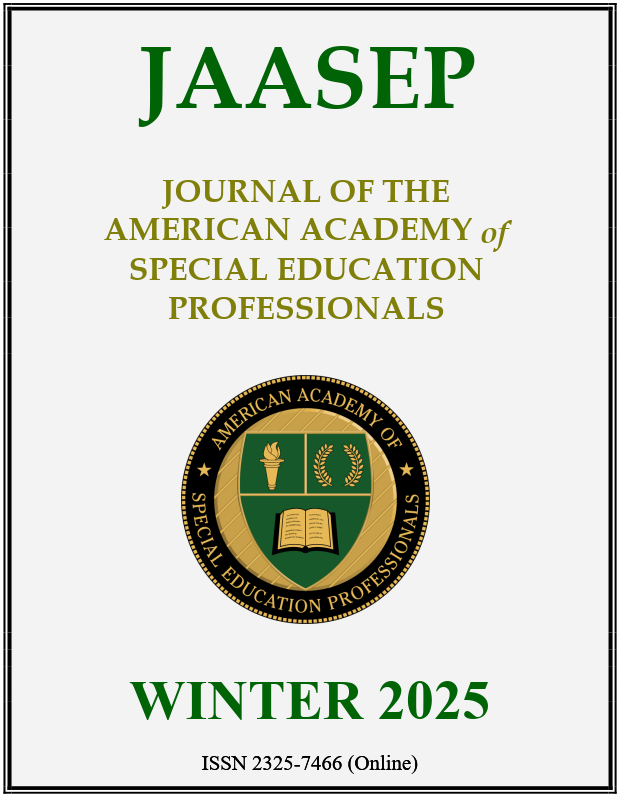The Best Kept Secret: Readability and Accessibility of IEPs
Blackwell, W., & Rossetti, Z. (2014). The development of Individualized Education Programs: Where have we been and where should we go now? Sage, 20(4), 1–15. https://journals.sagepub.com/doi/pdf/10.1177/2158244014530411 DOI: https://doi.org/10.1177/2158244014530411
Cadieux, C., Crooks, C., & King, C. (2019). Parents’ experiences with an individualized intervention designed to strengthen the family-school partnership: The parents in partnership with educators (PIPE) program. Exceptionality Education International, 29(2), 1-17. DOI: https://doi.org/10.5206/eei.v29i2.9398
DuBay, W. H. (2004). The principles of readability. Online Submission. https://files.eric.ed.gov/fulltext/ED490073.pdf
Flesch, R. (1963). How to write, speak and think more effectively. Signet Books. Individuals with Disabilities Education Improvement Act of 2004, 118 U.S.C. § 2647.
Irwin, V., Wang, K., Tezil, T., Zhang, J., Filbey, A., Jung, J., Bullock Mann, F., Dilig, R., and Parker, S. (2023). Report on the condition of education 2023 (NCES 2023-144). U.S. Department of Education. Washington, DC: National Center for Education Statistics. Retrieved [date] from https://nces.ed.gov/pubsearch/pubsinfo.asp?pubid=2023144.
Kupper, L. (2000). A Guide to the Individualized Education Program. Office of Special Education and Rehabilitative Services (ED), Washington, DC.; National Information Center for Children and Youth with Disabilities, Washington, DC.
Martin, J.E., Van Dycke, J.L., Christensen, W.R., Greene, B.A., Gardner, J.E., & Lovett, D.L. (2006). Increasing student participation in IEP meetings: Establishing the self-directed IEP as an evidenced-based practice. Exceptional Children, 72(3), 299-316. DOI: https://doi.org/10.1177/001440290607200303
National Center for Educational Statistics. (2021). National Assessment of Adult Literacy. Retrieved from https://nces.ed.gov/nationsreportcard/reading/achieve.aspx#2009_grade12.
Nord, C., Hicks, L., Hoover, K., Jones, M., Lin, A., Lyons, M., Perkins, R., Roey, S., Rust, K., and Sickles, D. (2011). The 2009 High School Transcript Study User’s Guide (NCES 2011–465). U.S. Department of Education, National Center for Education Statistics. Washington, DC: U.S. Government Printing Office.
Rosas, C. E., & Winterman, K.G. (2023). The IEP checklist: Your guide to creating meaningful and compliant IEPs. (2nd ed.) Paul H. Brookes Publishing Co.
Schaeffer, (2023). Striking findings from 2021. PEW Research Center.
Slade, N., Eisenhower, A., Carter, A.S., & Blacher, J. (2018). Satisfaction with individualized education programs among parents of young children. Exceptional Children, 84(3), 242-260. DOI: https://doi.org/10.1177/0014402917742923
Smith, R.F. (1984). How consistently do readability tests measure the difficulty of newswriting? Newspaper Research Journal, 5(4), 1-8. https://doi-org.xavier.idm.oclc.org/10.1177/073953298400500401 DOI: https://doi.org/10.1177/073953298400500401
White, S., & McCloskey, M. (n.d). Framework for the 2003 National Assessment of Adult Literacy (NCES 2005-531). U.S. Department of Education. Washington, DC: National Center for Education Statistics.
U.S. Department of Commerce, Census Bureau, U.S. Census of Population. (2021). Educational Attainment in the United States. Retrieved from https://www.census.gov/search-results.html?q=high+school+graduation+rate&page=1&stateGeo=none&searchtype=web&cssp=SERP&_charset_=UTF-8
Zirkel, P. A., & Hetrick, A. (2017). Which procedural parts of the IEP process are the most judicially vulnerable? Exceptional Children, 83(2), 219-235. https://doi.org/10.1177/0014402916651849 DOI: https://doi.org/10.1177/0014402916651849
Downloads
Article Information
- Article Type Articles
- Submitted December 9, 2024
- Published February 15, 2025
- Issue Winter 2025
- Section Articles
